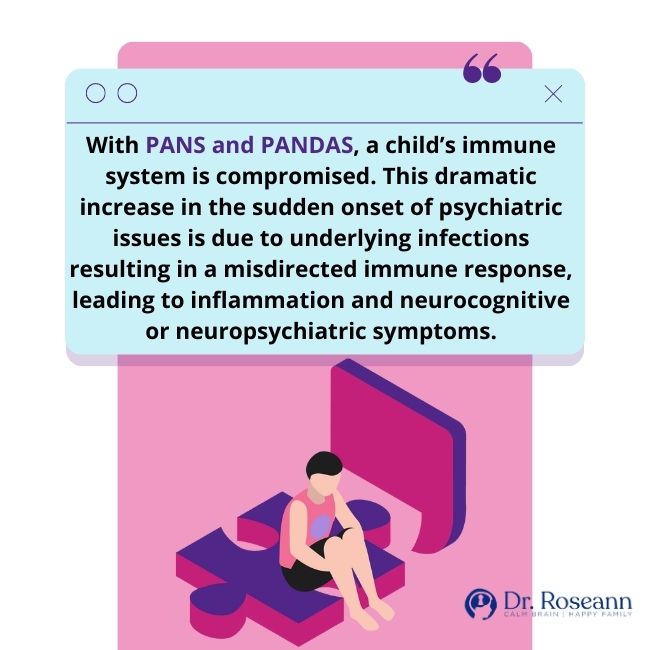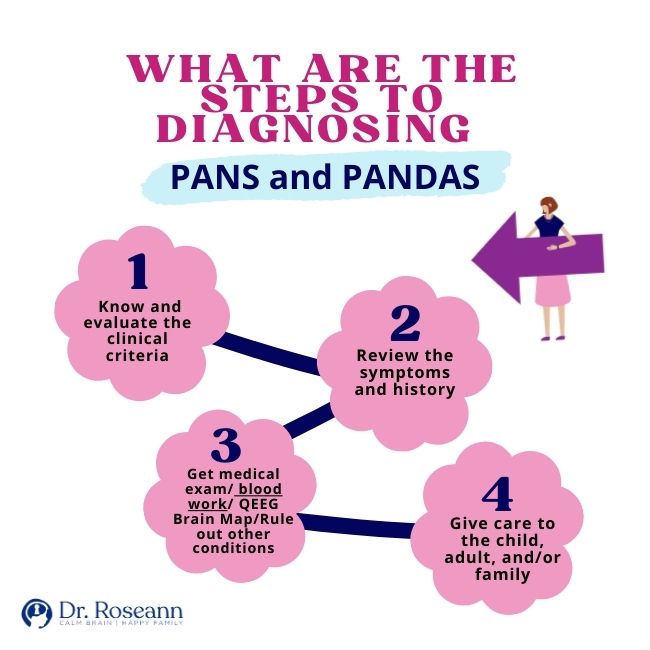Even though PANS and PANDAS are on the rise among children, getting a diagnosis is challenging for parents who simply can’t find knowledge or qualified providers. The refusal of the medical establishment to accept this very real medical condition has made diagnosis and treatment unnecessarily complex and hard on families.
Pediatric Acute-onset Neuropsychiatric Syndrome (PANS) and Pediatric Autoimmune Neuropsychiatric Disorder Associated with Streptococcal Infections (PANDAS) are complex disorders rooted in medical and autoimmune issues that lead to neuropsychiatric and neurocognitive problems.
They are an immune system disorder associated with streptococcal bacteria, Lyme bacteria, and other infections where a misdirected immune response causes the body to turn against itself.
Unfortunately, the underlying infectious disease and toxin triggers are often ignored because neuropsychiatric symptoms are the primary features of these two separate conditions. Instead, the focus turns to treating the presenting mental health issue with psychiatric medications such as SSRIs, antipsychotic medications, and ADHD medications to get the “behaviors under control.”
Loading up our kids with Ritalin or Adderall, Zoloft, Prozac, or Abilify isn’t address the underlying infection. Instead, it just puts duct tape on a hole the size of the one that sank the Titanic.
Anaka’s Story
Anaka was only nine years old, but her behavior was so out of control that she had already been in and out of a psychiatric hospital half a dozen times before she got to me. Her parents were just about to put her in a residential facility when they saw me talking about PANS and PANDAS on television. What I was talking about that day struck a chord, and they knew everything was wrong about Anaka’s diagnosis and treatment.
Anaka did have PANS from Lyme disease, Bartonella, pneumonia, and other viruses. We planned to calm her nervous system with PEMF, supplements, parent and cognitive behavioral therapy, and of course, got her to the doctor for medical treatment.
Slowly, Anaka’s hijacked brain began to calm, and so did her behavior. The old Anaka was back, never got sent away, and is off all psychiatric medications. That is what the right diagnosis and treatment plan can do.
Why Do Doctors Miss PANS and PANDAS?
Physicians and mental health providers aren’t trained to look for underlying infections and toxins causing the behaviors and health issues. Providers are trained to treat symptoms and not look for root causes, which drives our entire health system.
The psychiatric and neurocognitive symptoms of PANS, PANDAS, and AE look like clinical mental health issues. Since we have a pharma-driven mental health system when a patient presents with mental health symptoms, we assume a “chemical imbalance,” and the treatment for that is… a pill.
According to the National Institute of Mental Health, mental health issues are increasing. Kids with PANS and PANDAS often have other clinical diagnoses such as ADHD, sensory integration disorder, autism, speech delays, learning disabilities, handwriting problems, and other issues that can make the diagnosis more complex (Calaprice et al., 2017).
Physicians and mental health providers just don’t understand that the sudden onset of a mental health problem isn’t normal. No, we aren’t having a dramatic uptick in schizophrenia and bipolar disorder with psychosis.
With PANS and PANDAS, a child’s immune system is compromised. This dramatic increase in the sudden onset of psychiatric issues in a child or adult is due to underlying infections resulting in a misdirected immune response where the body attacks itself, leading to inflammation and neurocognitive and neuropsychiatric symptoms.
We don’t have a single test or battery that can definitively diagnose PANS, PANDAS, or AE, or even many underlying infections such as tick-borne disease. While lab work that tests for the underlying infections and issues common to PANS, PANDAS, and AE can be very helpful, it isn’t required for a diagnosis.
Some practitioners are hesitant to diagnose and treat without the presence of an infection, such as strep throat, at the time of diagnosis, even though it is a clinical diagnosis and there is no “gold standard” test(s) that are required.
If it looks like a duck and quacks like a duck, it's a duck. If the clinical symptoms are there and a thorough clinical and physical exam has ruled out other medical and mental health issues, treat it like PANS, PANDAS, or AE. Check with the PANDAS Physicians Network for more information.
How are PANS and PANDAS Diagnosed?
The first step in diagnosing PANS, PANDAS, and AE is to know what these clinical conditions look like. PANS is a clinical diagnosis for children who suffer from sudden onset of neuropsychiatric symptoms, including attachment disorders, obsessions, compulsions, or food restrictions.
PANDAS is a subset of PANS, a dramatic and sudden onset of a mental health issue, such as mood lability, obsessive-compulsive disorder (OCD), tics, restricted eating, anxiety, and even a loss of skills such as bladder functioning or regressive behaviors.
With autoimmune encephalitis (AE), the onset can be gradual. One 2017 survey of parents of children with PANS/PANDAS found that 8% had a gradual onset, and 87% experienced at least one additional episode beyond the presenting episode (Calaprice et al., 2017).
Is There a Lab Test That Can Diagnose PANS and PANDAS?
PANDAS disease, PANS, and AE diagnoses are made after a clinical interview and exam. No single test, not even the rapid strep tests, can diagnose these conditions. Lab work can provide useful information about what infections and toxins are present and what nutrients are missing.
I recommend specific tests that give us information about issues or weaknesses that can be addressed. A blood test that checks for strep infection is important because strep may be missed on a swab test and delay treatment.
It is important to run lab work to look at streptococcal infections, Lyme disease, tick-borne disease, herpes 6, Coxsackie, COVID, Epstein-Barr, scarlet fever, and other infections so the right treatment is given that addresses the underlying infection.
What are the Steps to Diagnosing PANS and PANDAS?
I have been working with people whose mental and physical health has been impacted by infectious diseases for 25 years. With that experience, I have developed my way of diagnosing and treating PANS/PANDAS/AE.
Step 1 – Know and evaluate the clinical criteria
Step 2 – Review the symptoms and history
Step 3 – Get medical exam/ blood work/ QEEG Brain Map/Rule out other conditions
Step 4 – Give care to the child, adult, and/or family
Sounds pretty simple, right? It isn’t because of the system's and providers' ignorance. Despite research that provides clear evidence that these conditions exist and are diagnosable and treatable, a common sense approach to diagnosis and treatment doesn’t prevail.
Instead, families are left to independently figure out every aspect of diagnosis and treatment. Then, they are criticized for being “Google MDs,” making this stuff up, and “being negligent parents for allowing the deterioration in school performance in their kids and treating their mental health problems with psychiatric medication.” What I have to say about that involves a slew of profanities, so let’s forge ahead and get the right information out so families can get the proper diagnosis and treatment.
Is there a Checklist to Diagnose PANS and PANDAS?
Having worked with thousands whose mental health has been impacted by infectious diseases, I developed a PANS/PANDAS Diagnostic Checklist so that providers can identify and treat those afflicted quicker.
Of course, when a person gets the right diagnosis, they can get the right treatment. With pediatric autoimmune neuropsychiatric disorder, symptoms of PANDAS and PANS may be missed.
With treatment, children with PANS and PANDAS need to address infection and inflammation, and the child and the family need behavioral support and guidance to navigate this life-altering disease.
Frequently Asked Questions
When should I seek medical help for suspected PANS or PANDAS?
If your child exhibits sudden, severe neuropsychiatric symptoms, consult a qualified healthcare professional promptly to explore potential PANS or PANDAS diagnosis.
Is early diagnosis important?
Early diagnosis is essential to initiate timely interventions, as it can lead to better treatment outcomes and improved quality of life for the child.
Can PANS and PANDAS affect adults?
While primarily affecting children, there have been rare cases of PANS and PANDAS reported in adults. However, more research is needed to understand its impact on adults fully.
Are there long-term effects of PANS and PANDAS?
Without proper treatment, PANS and PANDAS may lead to persistent neuropsychiatric issues, emphasizing the importance of early diagnosis and intervention.
How can I support my child through PANS and PANDAS diagnosis and treatment?
Be patient, supportive, and maintain open communication with healthcare providers. Educate yourself about the conditions to participate in your child's treatment journey actively.
Parent Action Steps
☐ Keep a detailed record of your child's sudden behavioral changes and symptoms
☐ Contact a qualified healthcare provider experienced in PANS and PANDAS
☐ Allow the healthcare professional to examine your child's medical history thoroughly
☐ Be prepared for laboratory tests to assess streptococcal infections
☐ Inform your child's school about the suspected condition and work together
☐ Assist the healthcare team in identifying potential triggers
☐ Consult with a psychologist or therapist skilled in evaluating neuropsychiatric issues
☐ Regularly track your child's response to treatment and communicate any changes
☐ Be a strong advocate for your child's well-being and treatment needs
☐ Take our Solutions Matcher for a customized treatment plan for your child
Citation
Calaprice, D., Tona, J., Parker-Athill, E. C., & Murphy, T. K. (2017). A Survey of Pediatric Acute-Onset Neuropsychiatric Syndrome Characteristics and Course. Journal of Child and Adolescent Psychopharmacology, 27(7), 607–618. https://doi.org/10.1089/cap.2016.0105
Always remember… “Calm Brain, Happy Family™”
Disclaimer: This article is not intended to give health advice and it is recommended to consult with a physician before beginning any new wellness regime. *The effectiveness of diagnosis and treatment vary by patient and condition. Dr. Roseann Capanna-Hodge, LLC does not guarantee certain results.
Are you looking for SOLUTIONS for your struggling child or teen?
Dr. Roseann and her team are all about science-backed solutions, so you are in the right place!
Download Dr. Roseann’s FREE PANS/PANDAS Diagnosis Checklist
Empower yourself with natural solutions for your child's mental health and behavior. Download our FREE quick start guide and start supporting your child today.
You can get her books for parents and professionals, including: It’s Gonna Be OK™: Proven Ways to Improve Your Child’s Mental Health, Teletherapy Toolkit™ and Brain Under Attack: A Resource For Parents and Caregivers of Children With PANS, PANDAS, and Autoimmune Encephalopathy.
If you are a business or organization that needs proactive guidance to support employee mental health or an organization looking for a brand representative, check out Dr. Roseann’s professional speaking page to see how we can work together.
Dr. Roseann is a Children’s Mental Health Expert and Therapist who has been featured in/on hundreds of media outlets including, CBS, NBC, FOX News, PIX11 NYC, The New York Times, The Washington Post, Business Insider, USA Today, CNET, Marth Stewart, and PARENTS. FORBES called her, “A thought leader in children’s mental health.”

She is the founder and director of The Global Institute of Children’s Mental Health and Dr. Roseann Capanna-Hodge, LLC. Dr. Roseann is a Board Certified Neurofeedback (BCN) Practitioner, a Board Member of the Northeast Region Biofeedback Society (NRBS), Certified Integrative Mental Health Professional (CIMHP) and an Amen Clinic Certified Brain Health Coach. She is also a member of The International Lyme Disease and Associated Disease Society (ILADS), The American Psychological Association (APA), Anxiety and Depression Association of America (ADAA) National Association of School Psychologists (NASP), International OCD Foundation (IOCDF) International Society for Neurofeedback and Research (ISNR) and The Association of Applied Psychophysiology and Biofeedback (AAPB).
© Roseann-Capanna-Hodge, LLC 2023












